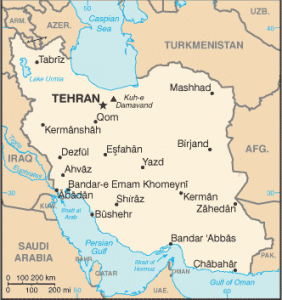The massive fleet of U.S. Navy warships continue to engage provocatively in the Persian Gulf, just south of Iran, while the U.S. media present Iranian patrols as deliberate threats.
 The Persian Gulf has been the focal point of grandstanding militarism in recent months, as U.S.-led sanctions aimed at crippling Iran’s oil and banking sectors have pushed the Iranians to threaten to close the Straits of Hormuz, through which 20 percent of the world’s oil export passes.
The Persian Gulf has been the focal point of grandstanding militarism in recent months, as U.S.-led sanctions aimed at crippling Iran’s oil and banking sectors have pushed the Iranians to threaten to close the Straits of Hormuz, through which 20 percent of the world’s oil export passes.
However, a recent report from the Congressional Research Service concluded such a move is a “a low probability event” given Iran’s profoundly inferior military and naval capacity and the fact that Iran relies heavily on the Strait for it’s own exports and economic well-being.
The threat was mainly a response to U.S. aggression and militarism, which is rarely addressed in the domestic news media. But onboard the USS Abraham Lincoln in the Gulf’s Strait of Hormuz, BBC reporter Jonathan Beale explained, “This carrier and these [fighter] jets are more than just a show of force, they’re here to send a clear message to Iran as to who really controls these waters.”
Similarly, Rear Admiral Roy Shoemaker admitted to the BBC, “The presence of this ship is provocative.”
Meanwhile, U.S. reports purport to show Iranian provocations. “Iranian patrol boats and aircraft,” reports the Washington Times, “shadowed a U.S. aircraft carrier strike group as it passed through the Strait of Hormuz on Tuesday.” But U.S. officers explained this was routine, even as helicopters flying above the aircraft carrier warded off any approaching Iranian boats, which are miniature compared to the U.S. warships.
A Washington Post story on the incident explained that some of these so-called clashes in the Gulf actually involved boats containing smugglers, and not Iranian navy patrol boats.
These tensions in the Persian Gulf and the harsh U.S.-led sanctions on Iran are due to Iranian noncompliance with U.S. demands to halt all uranium enrichment, despite it being Iran’s right to do so under the Nuclear Non-Proliferation Treaty. The Obama administration, the U.S. military, and the U.S. intelligence community are all in agreement that Iran’s nuclear program is so far civilian in nature.


